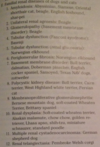01 - CRF and other stuff Flashcards
(23 cards)
upper urinary tract: kidneys & ureters
lower urinary tract: bladder and urethra
(renal failure)
- what 2 values are above normal range in renal failure?
- what is this called?
- BUN and serum creatinine
- azotemia
(prerenal azotemia)
- what causes this?
- 3 causes of this?
- USG?
- urine sediment? kidney size?
- reduced perfusion (nitrogenous waste accumulates)
- dehydration, shock, CHF
- highly conc
- both normal
(Postrenal azotemia)
- 2 causes?
- USG?
- sediment?
- imaging necessary for dx
- urine leakage into cavities or blockage of outflow from kidneys
- variable
- may have RBC or WBC
(primary renal azotemia)
- due to what?
- USG?
- sediment?
- renal parenchymal lesions
- urine can’t be highly conc
(< 1.04 in dogs and < 1.03 in cats)
- possible casts, WBCs, proteinuria
(azotemia)
- magnitude of azotemia doesn’t distinguish type
- what is more important factor to evaluate?
- USG
(azotemia)
(USG)
- what in prerenal?
- in primary?
- in post?
- high conc
- not high conc
- variable
(chronic renal failure)
- CRF occurs with at least what % of functional nephron mass?
- see increased serum phosphorus at what % loss?
- 75%
- 85%
(chronic renal failure)
- cause is usually due to what?
- higher risk in young or old?
- idiopathic (probably due to glomerular injury)
- old
(CRF in young animals)
- usually due to what?
- familial, infection, toxins
(familial rare in cats)
(Causes of CRF)



(chronic renal failure)
(diagnosis)
- azotemia, small kidneys, non-regen anemia
anorexia, vomiting, depression, wt loss
(renal bx not specific -> not indicated)
Progressive chronic kidney dz eventually results in CRF
- can detect CKD before CRF: look for what 4 things?
- kidneys getting smaller, ^renal mineralization, urine conc declines, proteinuria ^
Progressive chronic kidney dz eventually results in CRF
progressive self-propagating destructino of the chronically damaged kidney involves what two conditions in the glomerulus?
hypertension and hyperfiltration
(CKD)
(tx)
- feed a renal diet - two major factors of benefit?
- protein restriction only doesn’t protect kidney from progression - will reduce what though?
- dietary phosphate restriction may be adquate treatment to control serum phosphorus
- phosphorus restriction and omega-3 supplementation
- BUN
(CKD)
(phosphorus control)
- use what to control?
- intestinal phosphate binders
(aluminimum salts (hydroxide, carbonate) -> mainstay treatment)
(CRF)
- often give stomach stuff (H2 blockers, PPI)
- why?
- ^ gastrin (dec renal degradation of gastrin)
(CKD)
(ACE inhibition)
- proven beneficial in treatment of protein-losing nephropathy
- how is it renoprotective?
- lowers glomerular hypertension caused by lowering tone of the efferent glomerular arteriolar arteriole
(CKD)
(calcitriol therapy)
- proven benefit for survival in dogs
- why?
- decreases PTH (excess PTH is toxic to kidneys)
(CKD)
(control of systemic hypertension)
- important to prevent organ damage (eyes, brain, kidney)
- uncontrolled hypertension damages nephrons
- best drug for dogs?
- for cats?
- ACE inhibitor
- amlodopine
(progression of CKD and CRF)
- slower in cats or dogs?
- cats (months to years)
dogs about a year


